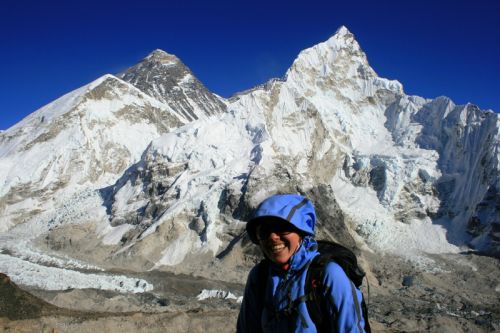Here’s what you should know about altitude sickness
Most of you joining one of our hiking trips in Nepal live and train at or close to sea level. There’s really no way of knowing how your body will react to the higher altitudes encountered on a trek. For example, just because you experienced little effects hiking up Kilimanjaro, doesn’t mean you won’t get sick trekking to Everest Base Camp. Altitude has always been the big unknown. You can’t train for it, and you won’t know how your body will cope at higher altitudes until you’re on the trail. However, for a fit individual taking on an itinerary allowing for proper acclimatization, hiking at high altitude isn’t something to be overly concerned about.

In general, most people will begin to notice the altitude at 8,000 feet and above. Acute Mountain Sickness (AMS) is the term used for medical conditions that can occur when you gain too much altitude too quickly and your body is unable acclimatize sufficiently. One World Trekking is based in Aspen, Colorado (7,908 feet) and we see this all the time. People fly in from sea level for a ski vacation, they get up the next morning tired and dehydrated, ride a ski lift to 11,000-plus feet and then experience a headache, nausea… This is why it is so important to follow an itinerary which follows gradual daily elevation gain and sleeping altitude to allow (as much as possible) our bodies to adapt.
The only effective way to truly prepare for hiking at high altitudes is to spend time hiking at high altitudes before the trip. For most people, however, this is just not possible. What is in the realm of possible is to get yourself as fit as possible before the trip. This would include a regular training program to include hiking, running, biking, swimming, weight training, exercise classes…it all counts! Longer weekend hikes while carrying your daypack and incorporating some hills will go a long way to getting you physically prepared for your trip.
At some point of your trip, you should expect to feel some short-lived altitude sickness issues, mostly in the form of a headache and loss of appetite. However, there are some things that you can do to help with the acclimatization process and prevent altitude sickness. Once the trek begins, walk at a slow and steady pace and take it easy when you arrive at your overnight accommodation. It is also VERY important to keep yourself well hydrated. Your body will use and lose more water than usual given the exertion of hiking combined with the drier air and lower humidity at higher altitudes. Ideally, you should set a goal of drinking 3 to 5 liters of fluid a day to include mostly water, soup, juice, soft drinks… Yes, coffee, tea and beer count, but tend to have a dehydrating effect as well.
Acute Mountain Sickness (AMS) is the most common form of altitude sickness, and the symptoms can include headache, loss of appetite, fatigue, shortness of breath, dizziness and trouble sleeping. These symptoms can appear soon after reaching high altitudes but will usually disappear as the body acclimatizes to the altitude. If you start to feel unwell you should let your trip guide know and they will be able to offer advice and keep an eye on you to ensure the symptoms don’t worsen. If you are sharing a room or tent you should let the person you are sharing with know you are feeling unwell so they can keep an eye on you as well. In most cases any symptoms of acute mountain sickness will disappear over time as your body acclimatizes to the altitude. However, if symptoms persist, the best advice is to stop ascending any further until your symptoms improve or descend to a lower altitude. Usually, descent to a lower altitude will reverse the symptoms of altitude sickness quite quickly.
Altitude sickness is something to be aware of, but not necessarily be overly concerned about. The human body is quite resilient and adaptable. Accompanied by a well-designed itinerary, you should experience only short-lived AMS symptoms, if any at all. Enjoy your trek!

